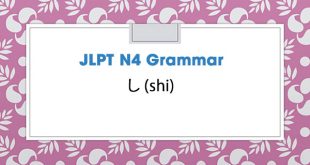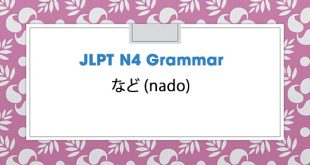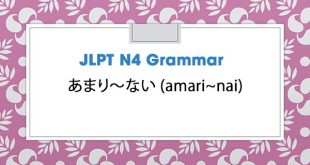Structure of purpose Grammar N4 Related Post: JLPT N4 Grammar Easy Explanation 20 Basic Japanese grammar structures
Read More »JLPT N4 Grammar
JLPT N4 Grammar Easy Explanation
JLPT N4 Grammar Easy Explanation Let’s study Japanese N4 grammar patterns that are often found in the JLPT N4 test. Related Post: JLPT N4 Grammar Practice with Answer Other ways to say はい “hai” in Japanese
Read More »Genki Grammar – Japanese
Genki Grammar – Japanese Genki Textbook grammar (English and Japanese Edition) Hope, the above document will be helpful for those who are studying Japanese. I wish you good study, good exam. Download : PDF Related Post: JLPT N4 Grammar: たら (tara) JLPT N4 Grammar: てみる (te miru)
Read More »JLPT N4 Grammar: ようだ (you da)
ようだ (you da) Meaning: it seems that; it appears that; it looks like; seems; looks as if~ How to use the: Verb-casual + ようだ いadj + ようだ なadj + なようだ Noun + のようだ Example sentences: 1, 雨のようだ。 ame no you da. It looks like rain.. 2, 彼は何かを推し測っているようだった。 kare wa nanika …
Read More »JLPT N4 Grammar: し (shi)
し (shi) Meaning: and; and what’s more; emphasis~ How to use the: Verb-casual + し いadj + し なadj + だし Noun + だし Example sentences: 1, 彼女は疲れている。頭痛がするし、背中も痛い。 kanojo wa tsukarete iru. zutsuu ga suru shi, senaka mo itai. She’s tired. She has a headache. She has a backache. 2, …
Read More »JLPT N4 Grammar: など (nado)
など (nado) Meaning: such as, things like, the likes of How to use the: Noun + など Example sentences: 1, 彼を愛する気持ちなど、わたしにはさらさらなかった。 kare o ai suru kimochi nado, watashi ni wa sarasara nakatta. I had not intended to love him. 2, 私はノート、ペンなどが必要だ。 watashi wa nooto, pen nado ga hitsuyou da. I …
Read More »JLPT N4 Grammar: ことがある (koto ga aru)
ことがある (koto ga aru) Meaning: there are times when; (something) happens on occasions; sometimes How to use the: Verb-casual, non-past + ことがある Example sentences: 1, ほとんどの人は、経済的な不安に直面することがあるだろう。 hotondo no hito wa, keizaiteki na fuan ni chokumen suru koto ga aru darou. Most of us face economic worries. 2, たまに自転車で通勤することがある。 tamani jitensha …
Read More »JLPT N4 Grammar: あまり~ない (amari~nai)
あまり~ない (amari~nai) Meaning: not very, not much~ How to use the: あまり + Verb-ないform あまり + Noun + じゃない/ではない あまり + いadj (-い) + くない あまり + なadj + じゃない/ではない Explain: 「あまり」 is an adverb that indicates the degree. When function as modifiers for adjectives, they are placed before the …
Read More »JLPT N4 Grammar: 全然~ない (zenzen~nai)
全然~ない (zenzen~nai) Meaning: (not) at all How to use the: 全然 + Verb-ないform Explain: Adverbs denote the degree, and when they function as a modifier, they are preceded by the verb. Meaning completely … no, always go with the negative sentence. Example sentences: 1, お金が全然ありません。 Okane ga zenzen arimasen. I …
Read More »JLPT N4 Grammar: んです (ndesu)
んです (ndesu) Meaning: to explain something; show emphasis How to use the: Verb (casual) + んです Explain: Used to explain a fact or give a reason Example sentences: A – どうしたんですか?元気がありませんね Dō shita ndesu ka? Genki ga arimasen ne What is the matter with you? Seems not good B – …
Read More » Learn Japanese Free Learn Japanese Free
Learn Japanese Free Learn Japanese Free










